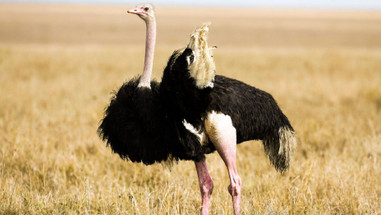Aug 6th 2019
Ostrich's strong immune system leading to breakthrough in antibody technology research.
How the largest birds on Earth and their strong immune systems lead to a breakthrough in antibody technology research
Ostrich antibody may just be the breakthrough technology needed in the biotechnological world. From daily commercialized products for prevention to promising findings in diagnostic and therapeutic, ostrich antibodies hold possibilities for everyone in the future.
Biotechnology is one of the world’s highest growth industry and has garnered the attention of governments and major corporations around the world for its seemingly limitless potential and value.
Across the spectrum of biotechnology, research on antibodies is at its peak. Antibodies are produced by the immune system in response to infections and illnesses. Generated from natural immune systems, antibodies are known as a safe solution for therapy without severe side effects. Touted as an indispensable component in a plethora of applications in medical and biomedical industries, antibodies although costly, are the future of diagnosis and therapeutic. From detecting diseases and antigens to treating an immune deficiency as well as various types of cancer, the future of antibodies research is endless.
Recent research has shown that antibodies can also be very beneficial to our daily issues, such as anti-ageing and allergy. With the high cost as the downside, there are many obstacles for the commercialization of antibodies and not everybody would be able to afford its benefits. However, there has been a breakthrough in antibody research, and that is ostrich antibody. With its lower costs and high stable quality, ostrich antibodies can be the brink that supports health and lifestyle worldwide.
Ostrich antibody and its massive benefits
Ostriches are one of the oldest animal species on Earth, having ancestors dating back to over 56 million years ago, the age of the dinosaurs. As such, ostriches have survived and evolved with one of the strongest immune systems in the animal kingdom. They can live up to 65 years in harsh environments and withstand viruses and infections that most animals cannot. The antibodies produced naturally in the ostriches possess a high quality and has many advantages over traditional antibodies derived from animals with a weaker immune system.
When it comes to antibody research, however, ostrich as a species has often been overshadowed by its fellow genus until recently. With its massive body mass, scientists found it troublesome to extract its antibodies in the traditional manner. Hence, animal-derived antibodies are often extracted from smaller sized mammals.
That is until a Kyoto University professor and veterinarian, Dr. Yasuhiro Tsukamoto, found a certain fascination towards the majestic flightless bird. During the avian flu outbreak that killed over hundreds of bird species, the ostrich was almost untouched by the virus, proving their strong immune systems.
Even then, there is still a big question that needs to be solved: how do you conveniently extract their antibodies without having to wrestle such a strong bird?
For more than two decades, Professor Tsukamoto researched and developed the technology with support from the Japan Science and Technology (JST), a scientific and technology-driven government agency. He found that ostrich eggs were the most efficient means of extracting antibodies.
Similar to many living beings, mothers often share their antibodies with their offspring, through the placenta, mammary glands and in the case of ostriches, through their unfertilized eggs. Their massive eggs provide an antibody mass equivalent to more than eight rabbits or 400 rats. This technology can extract large amounts of high-grade antibodies, up to four grams per egg. Further research has also shown that ostrich antibodies carry traits more promising than any other animal-derived antibody: its heat and PH resistance.
Many issues on antibody-based research are due to the fact that antibodies can easily be inactive at the acidic and alkaline environment. They are often sensitive towards small temperature range and may have an unstable batch quality. Ostrich antibody is hence a groundbreaking solution to the above problems. It has a high heat resistance more than 100 degree Celsius and a large PH range of 3.5 to 12.
Under Professor Tsukamoto’s research, ostrich antibody is proving to be promising for the detection and neutralization of diseases and viruses such as the Ebola viruses, Zika virus, Dengue, as well as various flu viruses, ranging from H1-H7 and B-type flu virus including Avian flu.
Antibody-based commercial products
Japan has long been known for capturing the delicate balance between nature and humanity by living through a minimal zen philosophy. They are also known for developing exciting, groundbreaking new technologies. These qualities create straightforward products with cutting-edge technology. The Japanese were among the first to discover and apply groundbreaking technologies into their high-quality products, especially reliable skincare treatments. From SK II to Olay, many of these products and ingredients have never been fully understood outside of Japan until recently.
One Osaka company, Zeal Cosmetics has utilized the ostrich antibody benefits into its line of skincare products. Another successful example is the creation of an antibody flu mask. It is a face mask that is lined with the ostrich antibodies, and is effective in the prevention of different types of flu viruses. It works by enveloping the viruses that come in contact with the mask. The innovative product has garnered sales over ¥100 million in three years in Japan.
Biomedical therapeutic and prevention
The ostrich antibody technology will lead developments and innovations in research, especially on the applications which have been proven beneficial, for instance in fighting skin diseases. Advancements in this technology will ultimately benefit human lives both on a medical and wellbeing standpoint. It is hoped for a future where ostrich antibodies will become widely marketable and accessible to everyone in the world.
Original article by Fadhilla Khairaruni

